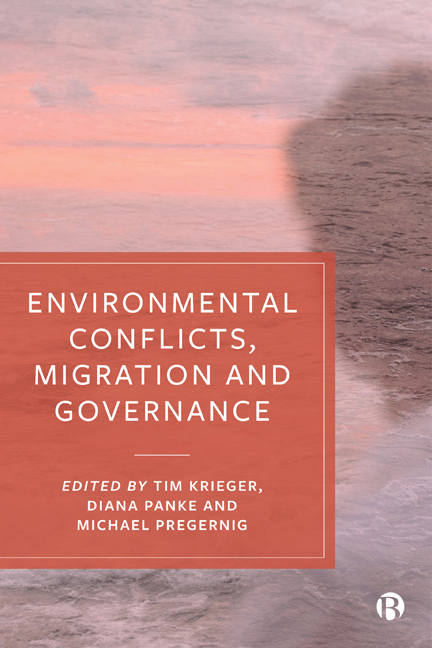Book contents
- Frontmatter
- Contents
- List of Figures and Tables
- List of Acronyms
- Notes on Contributors
- Acknowledgements
- 1 Environmental and Resource-Related Conflicts, Migration and Governance
- 2 Renewable Resource Scarcity, Conflicts and Migration
- 3 Extractive Resources, Conflicts and Migration
- 4 Climate Change, Conflicts and Migration
- 5 The Individual Level: Selection Effects
- 6 The Individual Level: Sorting Effects
- 7 Migration Governance at the State Level: Policy Developments and Effects
- 8 Environmental Migration Governance at the Regional Level
- 9 Migration Governance at the Global Level: Intergovernmental Organizations and Environmental Change-Induced Migration
- 10 The Link between Forced Migration and Conflict
- 11 Conflict-Prone Minerals, Forced Migration and Norm Dynamics in the Kimberley Process and ICGLR
- 12 On the Nexus Between Environmental Conflict, Migration and Governance: Concluding Remarks
- Index
9 - Migration Governance at the Global Level: Intergovernmental Organizations and Environmental Change-Induced Migration
- Frontmatter
- Contents
- List of Figures and Tables
- List of Acronyms
- Notes on Contributors
- Acknowledgements
- 1 Environmental and Resource-Related Conflicts, Migration and Governance
- 2 Renewable Resource Scarcity, Conflicts and Migration
- 3 Extractive Resources, Conflicts and Migration
- 4 Climate Change, Conflicts and Migration
- 5 The Individual Level: Selection Effects
- 6 The Individual Level: Sorting Effects
- 7 Migration Governance at the State Level: Policy Developments and Effects
- 8 Environmental Migration Governance at the Regional Level
- 9 Migration Governance at the Global Level: Intergovernmental Organizations and Environmental Change-Induced Migration
- 10 The Link between Forced Migration and Conflict
- 11 Conflict-Prone Minerals, Forced Migration and Norm Dynamics in the Kimberley Process and ICGLR
- 12 On the Nexus Between Environmental Conflict, Migration and Governance: Concluding Remarks
- Index
Summary
Introduction: management as an alternative to governance
There has been an important transformation of migration politics over the past two decades. Similar developments have also taken place in other fields, including in development and environmental politics (Loescher, 1993; Meadowcroft, 2010; Geiger, 2013; Hall, 2015, 2016; Bradley, 2017). While there has been a growing realization of the cross-border character of migration, refugee movements, conflicts and environmental changes, the repeated calls for stronger cooperation and global governance have in most cases failed to result in effective interstate governance. Instead, there has been increasing involvement of so-called actors ‘beyond the state’ (Jachtenfuchs, 2003) in global policy collaboration and implementation (Ghosh, 2000; Hollifield, 2004).
In the field of migration, in particular, intergovernmental organizations (IGOs) have gained agency, relevance and influence. Already in the 1950s, stronger interest in norms addressing migrants’ rights emerged (Loescher, 1993; Betts, 2011; Geiger and Pécoud, 2014). A crucial step in the early 1990s was the United Nation's (UN) creation of a Commission on Global Governance (Ghosh, 1993, 2000; Commission on Global Governance, 1995). The Commission was inspired by the general realization and emerging global consensus that migration and refugee movements require collective solutions. This Commission paved the way several years later for a thematically specific UN expert panel on migration, the Global Commission on International Migration (GCIM), in 2003. The GCIM's work resulted in a widely debated final report (GCIM, 2005), but due to the resistance of many states, there was no real progress towards a genuine international framework on migration. There have been various attempts at other discussion forums, both at the global level as well as at the level of regional consultative forums (Thouez and Channac, 2005; see also Chapter 8 of this volume).
An important common feature of these intergovernmental discussions was that these processes avoided, almost completely, the term and any direct reference to, global governance, while at the same time strongly emphasizing the completely voluntary and non-binding nature of their meetings (Georgi 2010; Kalm, 2010; Geiger 2013, 2016). States and IGOs deliberately referred to and used a different terminology of ‘management of migration’, instead of governance. The concept of migration management has seen wide use over the years, and also faced outspoken criticism (see Andrijasevic and Walters, 2010; Geiger and Pécoud, 2010; Georgi, 2010; Kalm, 2010; Ashutosh and Mountz, 2011; Geiger, 2013, 2016; Heller, 2014).
- Type
- Chapter
- Information
- Environmental Conflicts, Migration and Governance , pp. 157 - 176Publisher: Bristol University PressPrint publication year: 2020



